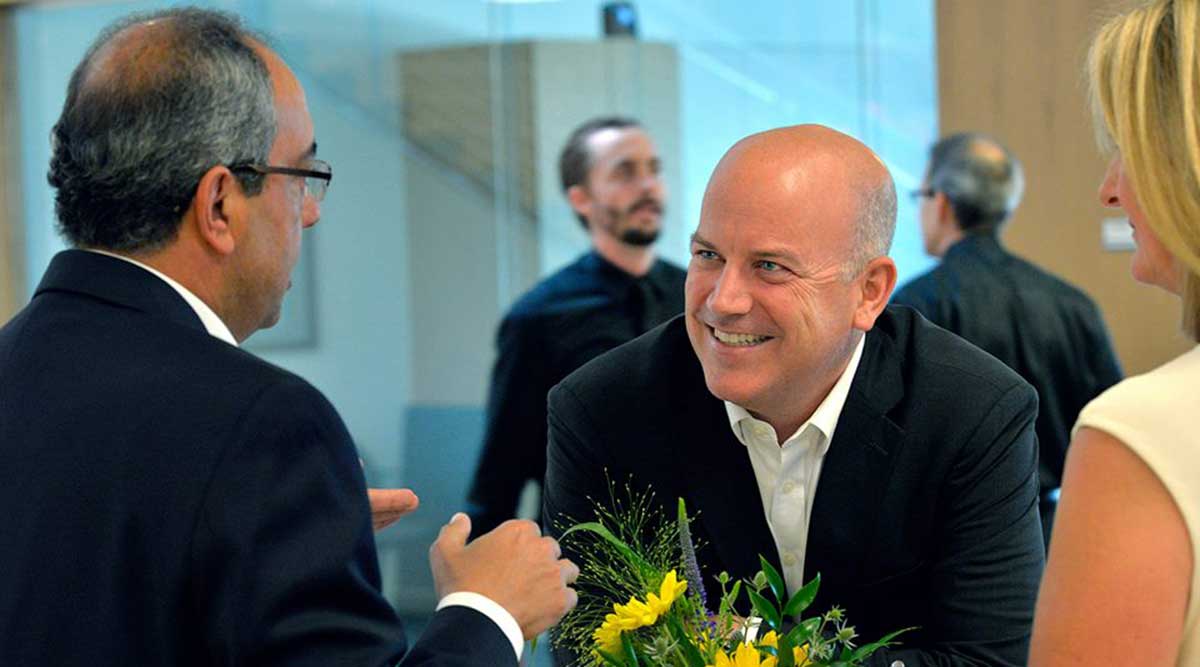Port of Portland Appoints Curtis Robinhold Executive Director

The Port of Portland Commission unanimously selected Curtis Robinhold to succeed his boss as the port's executive director.
Robinhold, the deputy and Bill Wyatt's hand-picked successor, was chosen May 23 after a national search. He was one of 150 candidates and three finalists —who included executives from ports in New York and Mississippi — vying to replace Wyatt, who retires at the end of June.
One after another, commissioners said May 23 that Robinhold, 48, was the superior candidate. As the port's deputy director since 2013, he has years of hands-on experience, a background in Oregon and internationally, experience and contacts in both politics and business, and familiarity with the issues and stakeholders around the region.
All eight commissioners present cast votes for Robinhold. And the one member absent, Tom Tsuruta, submitted a letter of support.
Bob Levy, a commissioner and farmer from the Hermiston area, said Robinhold represents the qualities the commission was looking for and understands the challenges ahead, from airport operations to the shortage of industrial lands, the idled Terminal 6, the port's financial sustainability and the Portland Harbor cleanup.
"The challenges ahead are daunting for the next executive director," Levy said. "It's not about being here and continuing the stuff that has been done in the past. It's about a new way."
@PortOfPortland I'm honored to lead the port in its next chapter. Best employees, best airport, endless opportunity to link OR people/products to the world. — Curtis Robinhold (@crobinhold) May 23, 2017
Robinhold was not available May 23, but the port issued a statement attributed to him.
"I am humbled by the opportunity to lead the Port of Portland and the dedicated employees who work so hard to make a difference in our region. Job number one will be to get out into the community and hear what's on people's minds as we set the vision for the work ahead."
The port received plenty of public comments on the search, and Commission President Jim Carter said those comments represented a strong endorsement of both the process and Robinhold.
Not everyone agreed. Individual commenters and environmental groups such as the Audubon Society of Portland and Willamette Riverkeeper said they were disappointed with the port's search process, which included only a 14-day public comment period and lacked robust public engagement through a public forum.
The two groups conducted their own interviews of the three finalists via Skype but said, "We heard very little that gave us confidence that any of the three finalists were likely to bring a strong sense of vision or innovation to the job or was prepared to take the kind of hard look at port operations that can lead to major changes."
They criticized Robinhold's role in developing what they called "a weak cleanup plan" for the Portland Harbor that was unacceptable to the community.
"Our biggest concern is that we have not seen anything during Mr. Robinhold's time as deputy director of the port that suggests that he would significantly alter the way the port operates," the groups wrote. "If anything, the port's challenges on environmental and community engagement seem to us to have increased in recent years."
The port is a complex enterprise where operations comprise the airport, marine shipping terminals and industrial properties around the city. Billions of dollars of goods and millions of passengers pass through its facilities annually. It's a crucial player in economic development statewide, from travel and tourism to shipping Oregon-made products throughout the globe.
Though the agency operates largely under the public's radar, it has become a lightning rod for environmental and community activists, as well as labor groups and exporters around the state.
Robinhold inherits several contentious problems, including an idled container shipping terminal split from its former operator, the Philippines-owned ICTSI Oregon. The terminal lost its two main carriers, Hanjin Shipping and Hapag-Lloyd, amid labor strife with the longshore union in early 2015, forcing eastern Oregon agricultural producers to pay as much as $1,000 more per container to truck their goods to Tacoma and Seattle.
He also faces major environmental issues with the cleanup of Portland Harbor Superfund site and will be responsible for the $1 billion modernization plan for Portland International Airport, which will upgrade the basic infrastructure of the facility over the next decade.
During the selection process, Robinhold had support among business groups and former colleagues, who described him as a decisive leader who had a strong relationship with the Portland business community.
Joe Whitworth, president of the Freshwater Trust, said he'd worked with Robinhold to identify options for solving the region's growth and environmental balance.
"He's consistently demonstrated an innovative, solution-first attitude in a sometimes difficult operating environment" Whitworth wrote. "Because there are rarely easy answers to complex problems, the ability to path-find and see a vision through to resolution is of significant and increasing value. Curtis would bring that to the work of the Port of Portland and the broader community."
While the port did hold a lengthy search, Robinhold's ascension to the top job has been telegraphed since 2013.
That's when Wyatt, the former chief of staff of former Gov. John Kitzhaber, reached back into the governor's office to select Robinhold, then Kitzhaber's chief of staff, as his deputy.
At the time, it was a new position. It wasn't posted or announced, and there was no search. The meeting materials Wyatt filed with commissioners before they considered the appointment said he expected Robinhold would quickly assume the responsibilities of the port's chief executive.
"While the commission will remain free to choose the next executive director," the agenda item said, "it is expected that the deputy will become the most qualified candidate."
And that's what happened.
The port said the selection is final, pending the establishment of an employment package.
The position is among the highest paying in state government, with a posted annual range of $303,000 to $530,000. Wyatt currently earns $418,419 a year and was paid a bonus of $39,540 last November. Robinhold earns $315,977 and was paid a $29,816 bonus last year.


